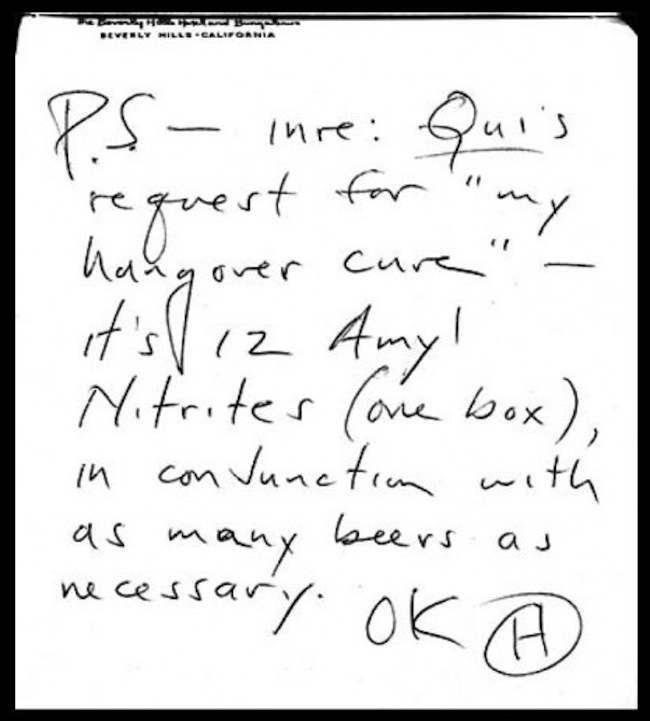10 hangover cures from famous writers
WHAT’s your favourite cure for a hangover?
Hunter S. Thompson recommended poppers and beer.
Kingsley Amis recommended the Polish Bison (Bovril beef paste and vodka) and/ or a cup of Grand Marnier at breakfast.
“When that ineffable compound of depression, sadness (these two are not the same), anxiety, self-hatred, sense of failure and fear for the future begins to steal over you, start telling yourself that what you have is a hangover. You are not sickening for anything, you have not suffered a minor brain lesion, you are not all that bad at your job, your family and friends are not leagued in a conspiracy of barely maintained silence about what a shit you are, you have not come at last to see life as it really is.”
Adding:
“…few writers can be taken as metaphorically illuminating the world of the hangover while ostensibly dealing with something else. Perhaps Franz Kafka’s story ‘The Metamorphosis,’ which starts with the hero waking up to find he has turned into a man-sized cockroach, is the best literary treatment of all. The central image could hardly be better chosen, and there is a telling touch in the nasty way everybody goes on at the chap.”
He wrote in Lucky Jim:
His mouth had been used as a latrine by some small creature of the night, and then as its mausoleum. During the night, too, he’d somehow been on a cross-country run and then been expertly beaten up by secret police. He felt bad.
PG Wodehouse broke the hangover into six breeds: The Broken Compass, the Sewing Machine, the Comet, the Atomic, the Cement Mixer and, of course, the Gremlin Boogie. His great character Jeeves had a restorative in Jeeves Takes Charge. It was Worcestershire sauce, raw egg, and pepper:
“It felt as if someone had touched off a bomb inside the old bean and was strolling down my throat with a lighted torch.”
Jeeves also advices a luncheon of a dozen lamb chops and a battered pudding.
William Faulkner
“I think that — that anyone, the painter, the musician, the writer works in a — a kind of an— an insane fury. He’s demon-driven. He can get up feeling rotten, with a hangover, or with — with actual pain, and — and if he gets to work, the first thing he knows, he don’t remember that pain, that hangover — he’s too busy.”
Anthony Burgess drank the Hangman’s Blood.
“Into a pint glass, doubles of the following are poured: gin, whisky, rum, port and brandy. A small bottle of stout is added and the whole topped up with Champagne … It tastes very smooth, induces a somewhat metaphysical elation, and rarely leaves a hangover.”
Stephen King just carried on drinking:
“I didn’t just have a problem with beer and cocaine, I was an addictive personality, period. I was smoking two packs of cigarettes a day, I loved Listerine, I loved NyQuil, you name it. If it would change your consciousness, I was all for it.”
W.C. Fields in The Bank Dick
One breaded veal cutlet in tomato sauce and a chocolate eclair; liver and bacon; 2 pickled eggs and castor oil; Hungarian ghoulash and coconut custard pie.
Charles Bukowski had a story:
In 1965, William S. Burroughs talked to Conrad Knickerbocker for the Paris Review. He had a new kind of hangover:
I had my most interesting experiences with mescaline when I got outdoors and walked around – colors, sunsets, gardens. It produces a terrible hangover, though, nasty stuff. It makes one ill and interferes with coordination. I’ve had all the interesting effects I need, and I don’t want any repetition of those extremely unpleasant physical reactions.
Ernest Hemingway:
“Pour 1 jigger of absinthe into a champagne glass. Add iced champagne until it attains the proper opalescent milkiness. Drink three to five of these slowly.”
Amen.
Posted: 21st, April 2013 | In: Key Posts, Reviews 0 Comments | TrackBack | Permalink



